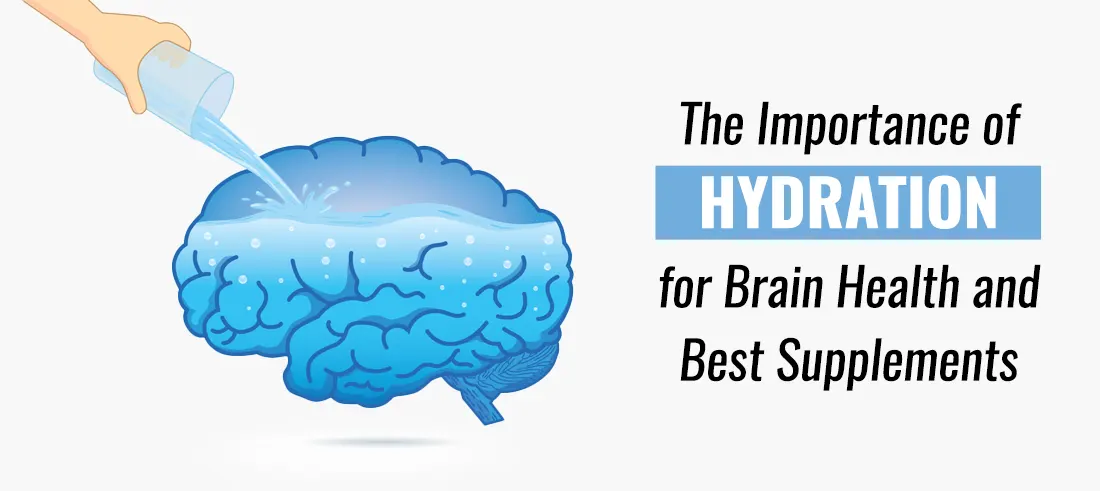Introduction
While you may know about the negative effects of low hydration levels on the body, are you aware of the importance of hydration for brain health? Proper hydration helps nourish brain cells, remove toxins, and promote efficient electrical signaling between neurons.
It is essential in multiple cognitive functions including memory, focus, mood, and learning. Evidence indicates that even mild dehydration at 1-2% water loss [1] can lead to an impairment in cognitive performance, highlighting the importance of water intake for brain health.
Key Takeaways
- Hydration is essential for brain health, as the brain is 75% water.
- Dehydration leads to brain fog, poor focus, and mood issues.
- Prevent it by drinking more water, eating hydrating foods (e.g., watermelon, citrus), and using herbal teas or supplements.
- Hydration needs vary by age, gender, and activity, but keeping water intake high supports cognitive function.
How Hydration Affects Brain Health
Hydration levels can impact brain health significantly, and dehydration may have both short and long-term effects on cognition.
- The Role of Water in the Brain: According to science, the brain is composed of approximately 75% water, making it essential for optimal functioning. When the balance of hydration in the cells is disrupted, it may impact efficiency and lead to impairments.
- Cognitive Functions: Improper hydration can disrupt electrolyte balance and lower nutrient availability in brain cells, leading to difficulty with cognitive functions such as short-term memory, long-term recall, focus, mental clarity, and overall cognitive performance.
A study of male college students in China published in the International Journal of Environmental Research and Public Health found a link between hydration and memory improvement [2].
- Dehydration and Brain Health: Potential dehydration effects on brain function include poor mental focus and concentration, fatigue, headaches, low mood, irritability, and problems with memory. If the dehydration is short-term, taking measures to boost liquid levels can alleviate these issues.
- Long-Term Effects: Long-term dehydration may decrease the size and mass of cells and impair cognitive performance, learning, and memory. In extreme cases, this may lead to permanent damage to cognitive functions, although rehydration over time can often improve symptoms.
The Science Behind Hydration and Cognitive Performance
What is the biological link between hydration and cognitive function? From a scientific perspective, water levels impact the brain in several key ways:
- Neuronal Activity: Brain neurons require hydration to support the optimal balance of electrolytes required for their proper functioning. This includes producing key neurotransmitters essential to cognitive health and mood.
- Blood Flow and Oxygen Supply: Brain hydration benefits cerebral circulation, and the additional blood flow to the brain transports required oxygen and nutrients to sharpen mental focus and attention and improve cognitive functioning.
- Electrolytes and Brain Signals: Hydration helps ensure optimal brain electrolyte levels, which are required for neurons to effectively transmit electrical signals and communicate with other cells.
 Water intake for brain health
Water intake for brain healthSigns of Dehydration and Its Impact on Brain Health
The Importance of hydration for brain health can’t be understated, as evidence indicates that even mild dehydration can cause difficulty with cognitive functioning. How do you know if you are dehydrated? Common symptoms include:
- Thirst
- Dry mouth
- Dizziness or lightheadedness
- Difficulty concentrating
- Headaches
- Irritability
- Dark-colored, unpleasant-smelling urine
- Dry, pale skin
If the dehydration becomes severe, additional symptoms may include:
- Rapid heartbeat and/or breathing
- Confusion
- Listlessness
- Sunken eyes
Maintaining hydration is essential for optimal brain health, as even mild dehydration can negatively affect cognitive functions. However, proper hydration alone may not always address the need for enhanced mental clarity and focus. For those looking to support brain health further, supplements like CogniUltra® offer a powerful cognitive boost. This all-natural formula is designed to improve memory, concentration, and overall mental sharpness by enhancing blood flow, oxygen levels, and neurotransmitter function in the brain. Whether you’re facing age-related cognitive decline or just looking for a mental edge, Cogniultra® provides essential nutrients that promote sustained focus and a more vibrant mind.
Hydration is Key, Cogniultra® is the Boost. Get Yours and Feel the Difference!
Best Practices for Staying Hydrated
Daily Water Intake Recommendations
The ideal daily water intake varies based on factors like age, gender, activity levels, and overall health. Based on the U.S. National Academies of Sciences, Engineering, and Medicine guidelines [3], the ideal intake for adult men is 15.5 cups (3.7 liters/125 ounces) daily, and 11.5 cups (2.7 liters/91 ounces) for adult women. As 20% of liquid comes from food, the rest should be beverages.
Children under 6 months should not drink water, but from 6 months to a year they should be getting about 4-8 oz/day (half a cup to a cup). According to Johns Hopkins Medicine [4], until the age of 8, children should drink an 8-ounce glass of water every day for each year of their age. After the age of 8, kids should drink 8 glasses of water daily.
Lifestyle factors that require higher hydration include intense exercise, which causes you to sweat and lose water, and hot, humid weather. In addition, with physical illness that includes fever, vomiting, or diarrhea, you must take in higher levels of hydration to combat the loss.
Tips for Maintaining Optimal Hydration
Follow some of these tips and suggestions for maintaining hydration levels:
- Drink water and other hydrating beverages consistently throughout the day.
- Consume hydrating foods like cucumber, watermelon, celery, and pineapple
- Avoid dehydrating beverages like caffeine or alcohol.
- Drink before, during, and after a workout or sports activity.
- Carry a water bottle with you during the day.
- Drink a glass of water before each meal and consume liquid during the meal.
The Role of Hydration in Mental Health
Brain hydration benefits mental health, and dehydration may lead to low mood, depression, irritability, and anxiety. Neural cells require adequate hydration to receive the amino acids and other nutrients needed to produce brain neurotransmitters involved in mood, like dopamine and serotonin.
Dehydration could deplete mood or cause depression, especially if it is chronic. Proper hydration levels are also required to keep cortisol levels from rising, and a lack of liquid could cause a spike leading to anxiety and stress.
 Hydration and memory improvement
Hydration and memory improvementChronic dehydration could shrink the size of the brain cells and may lead to permanent damage if severe and persistent. While there is no consensus on whether the issue may lead to Alzheimer’s disease and other neurodegenerative conditions, research shows that low fluid levels can lead to a buildup of toxins that may increase the risk [5]. Hydration is essential for flushing out damaging elements that could lead to neurodegeneration.
Best Supplements for Brain Health and Hydration Support
To ensure optimal levels, we recommend taking supplements along with your daily liquid intake to boost hydration. Some of the best brain supplements for hydration include:
Electrolyte Supplements
Taking electrolyte supplements helps replenish fluid levels to prevent dehydration, ensuring that electrical signals in the brain function optimally. These supplements for brain hydration help improve mood, lower stress, and boost cognitive functioning.
Nootropics and Cognitive Enhancers
There are multiple nootropic and cognitive-enhancing supplements on the market that help enhance brain health and function. Look for products that include some of the following key cognitive support ingredients:
- L-Theanine
- Omega 3 Fatty Acids
- Phosphatidylserine
- L-Glutamine
- L-Tyrosine
- Choline Bitartrate
- Ginseng
- Ashwagandha
- Ginkgo Biloba
- Rhodiola Rosea
Hydrating Supplements
Additional optimal supplements for brain hydration include coconut water powder, which contains the 5 potent electrolytes sodium, magnesium, calcium, potassium, and phosphorus. Coconut water is safe to drink daily, although it does have some calories.
For optimal hydration, you may also consider drinking water already enhanced with electrolytes, or blending an electrolyte powder. Follow the instructions carefully to prevent overhydration.
Natural Hydration Sources
Water-Rich Foods
To keep brain hydration levels high, incorporate water-rich foods into your daily regimen, including:
 Best brain supplements for hydration
Best brain supplements for hydration- Watermelon
- Citrus Fruits
- Cucumbers
- Strawberries
- Celery
- Radishes
- Iceberg and Romaine Lettuce
- Tomatoes
- Bell Peppers
- Asparagus
- Mushrooms
Herbal Teas
Several herbal teas offer brain hydration benefits, so if you’re a tea lover consider drinking more of these blends:
- Chamomile
- Rooibos
- Rose
- Hibiscus
- Mint
- Nettle
Conclusion
Maintaining optimal hydration levels is essential for overall health, and it also plays a significant role in supporting cognitive functioning. Water helps nourish brain cells, promote efficient electrical signaling between neurons, and remove harmful toxins to support learning, thinking, mood, and other brain functions.
Dehydration of even 1-2% can lead to impairments like poor focus and concentration, irritability, and difficulty with short-term memory. Keeping hydrated daily is the key, so ensure that you drink the recommended liquid intake, include water-rich foods and teas in your diet, and consider supplementing with electrolytes, nootropics, or hydrating supplements. Taking these steps daily to boost your water intake should ensure optimal brain health and cognitive functioning.
Frequently Asked Questions (FAQs)
How much water should I drink for brain health?
Individual guidelines vary depending on age, activity level, and health, but the recommended guideline is 15.5 cups daily for adult men and 11.5 cups for adult women. Children over 8 should drink 8 cups daily, and younger kids should drink one cup for each year of their age.
Can dehydration cause brain fog?
Yes, dehydration can deplete water levels in the neural cells and impair mental focus, sometimes leading to brain fog.
What supplements help with both hydration and cognitive function?
You can boost water levels and cognitive function by taking some of the best brain supplements for hydration or including electrolytes, which should also enhance brain health. In addition, there are nootropics with ingredients that enhance cognitive function, like ashwagandha, l-theanine, omega 3s, and l-glutamine.
What is the best way to hydrate your brain?
The best way to hydrate your brain is by ensuring that you take in the recommended intake of liquids daily from foods, beverages, or teas. In addition, you can take supplements for brain hydration or electrolytes for optimal levels.
References
- The Hydration Equation: Update on Water Balance and Cognitive Performance: https://pubmed.ncbi.nlm.nih.gov/25346594/
- Effects of Dehydration and Rehydration on Cognitive Performance and Mood among Male College Students in Cangzhou, China: A Self-Controlled Trial: https://www.ncbi.nlm.nih.gov/pmc/articles/PMC6603652/
- Water: How Much Should You Drink Every Day? https://www.mayoclinic.org/healthy-lifestyle/nutrition-and-healthy-eating/in-depth/water/art-20044256
- https://www.hopkinsmedicine.org/health/wellness-and-prevention/Summer-Hydration-What-Should-Kids-Be-Drinking-In-The-Summer
- Neurocognitive Disorders and Dehydration in Older Patients: Clinical Experience Supports the Hydromolecular Hypothesis of Dementia:



